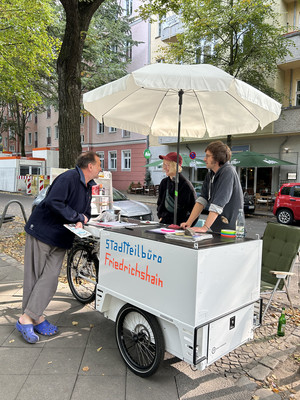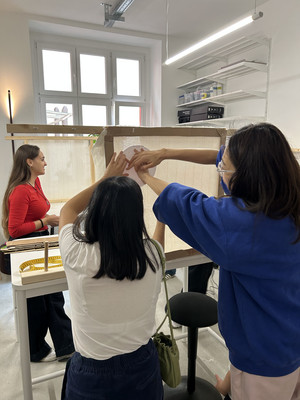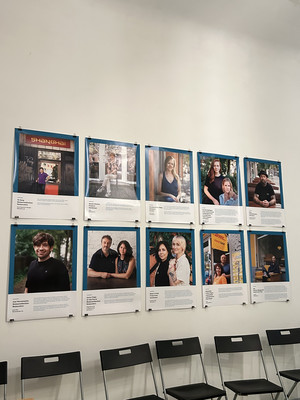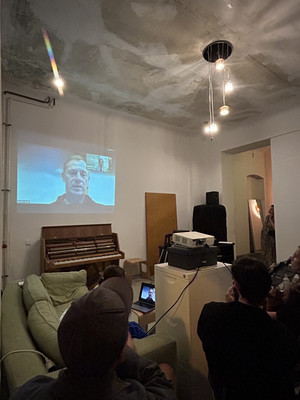
Salzburg Global Fellow Elaine Yeung reflects on the power of redefining urban spaces through community-driven placemaking

-
Elaine Yeung reflects on the transformative power of community-driven placemaking in creating meaningful urban spaces, emphasizing the importance of connecting residents and fostering a sense of belonging.
-
Elaine shares her firsthand experience organizing a block party in Berlin's Friedrichshain district, where she applied her knowledge from her Urban Studies degree and Public Policy New Voices Europe Fellowship to create an inclusive event promoting neighborliness and cultural understanding.
-
Placemaking serves as a powerful tool for policymakers, emphasizing the need for a nuanced understanding of community experiences.
This op-ed was written by Elaine Yeung, who attended the Public Policy New Voices Europe program "Advancing Together: Empowering Diverse Leadership in Public Policy" in Salzburg from September 24 to 28, 2023.
I’ve spent my life living in cities across three continents, so my interest in placemaking is personal. How can I start feeling at home in a city? What do I identify my neighborhood with? Where can I connect with my neighbors? Some obvious answers include easy access to transportation and amenities; communal (green) spaces and civic buildings; local shops and services; and community groups giving a platform for residents’ needs and concerns.
Urban dwellers’ lives are multi-faceted, touching on disciplines ranging from architecture, arts, culture, and history to the environment and socio-economic policies. Placemaking is about acknowledging, and celebrating, the “physical, cultural, and social identities that define a place and support its ongoing evolution”. Understanding the value of this interdisciplinary lived experience, which extends beyond physical structures and buildings, is at the core of placemaking work.
This autumn, I co-produced a block party on the three blocks of Weichselstraße, a street in Berlin’s Friedrichshain district. This event was an opportunity for me to roll up my sleeves and put into practice what I had studied in my Urban Studies master’s degree, learned about placemaking through workshops and events, and discussed in our Public Policy New Voices Europe Fellowship. For me, the block party was an important reminder that placemaking is about bringing much of what already exists in a community to the fore while encouraging members of the community to take the lead in shaping what they want their neighborhood to be – and become.
Organized by Urban Hosts, a program series on urban living and city governance, the block party extended ongoing conversations on neighborliness, which had been taking place for ten years in a studio space on this street, into the neighborhood by engaging residents, shop owners, and local groups in discussions, workshops, information booths, and an exhibition. As a producer, I conducted desk and on-site research on the neighborhood’s demographics, infrastructure, architecture, and existing networks to answer key questions: Who are the people and living organisms belonging to this community? How long have they lived here, how do they live, and why have they chosen to live here? What kinds of social infrastructures exist? What causes do residents care about?
Weichselstraße is located in what used to be East Berlin. 33 years after reunification, German identity along the east-west divide continues to be a heated topic. Hosting a block party in this former working-class, now quickly gentrifying neighborhood, meant being respectful of different cultural and historical identities, as well as being conscious of implications from city-wide post-reunification infrastructural projects and evolving demographics, including a growing expat population. At the same time, there was immense potential in what the neighborhood’s old and new could create together. The block party provided the space for these encounters.
Over two days, through bilingual events, long-time and new Friedrichshain residents gathered to learn more about the history, architecture, and culture of their district. Our youngest neighbors built instruments from recycled material together in a workshop run by a local initiative. Weichselstraße’s business owners, from a textile co-op, kiosk, restaurants, and cafes to a pole-dancing studio and live music venues, opened their doors for performances and drop-ins. Community initiatives updated residents on the local government’s current traffic control and redevelopment plans.
Working at the block party gave me a chance to approach placemaking both from a user’s and policy perspective. That weekend, going from one event to the next on Weichselstraße, I saw promising signs of new connections as neighboring businesses spoke about collaborating with each other. One community group offered to lend its cargo bike, doubling as a mobile information booth, to another group one weekend later. A longtime resident reached out about expanding the block party to include more streets next year.
These encounters made me realize the myriad possibilities arising when members of a community take ownership of a place - it becomes more than “just functional, but also beautiful and meaningful to the people who live, work, and play there”. Placemaking is a powerful tool for policymakers in their work with communities. To properly represent and speak for their communities, policymakers must first understand lived experiences there – and that the members of these communities are some of their most valuable resources.




Photos taken by Elaine during the Weichselstraße block party
Elaine Yeung is a social media manager of the Humboldt Forum in Berlin. She is an urbanist and a communications specialist committed to strengthening the ties between arts and culture, urban development, and public policy. She has previously worked as a consultant for the NGO Designing Hong Kong and as an arts administrator in the classical music industry. Elaine holds a BA in music and English from New York's Barnard College, Columbia University, and a MSc in urban studies from University College London. She is a Fellow of Salzburg Global’s Public Policy New Voices Europe Fellowship cohort 2.
Public Policy New Voices Europe connects, supports, and empowers a new generation of diverse leaders in public policy across Europe. This dynamic year-long fellowship program seeks to address the challenges faced by underrepresented groups and emerging leaders in the public policy arena by providing a platform for support, mentorship, networking and skill-building. connects, supports, and empowers a new generation of diverse leaders in public policy across Europe. This dynamic year-long fellowship program seeks to address the challenges faced by underrepresented groups and emerging leaders in the public policy arena by providing a platform for support, mentorship, networking, and skill-building.